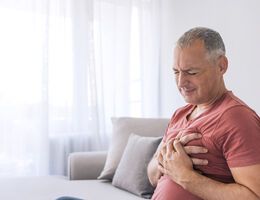Heart attack 101

When a heart attack happens, there's no time to spare. Knowledge and planning can help you act fast.
Questions1. What causes a heart attack?
2. What are the warning signs of a heart attack?
4. Can life return to normal after a heart attack?
5. When can I go back to work?
6. Will I need to keep seeing my doctor?
7. What can I do to prevent a second heart attack?
8. Is it safe to have sex after a heart attack?
10. Can I exercise after having a heart attack?
11. What if I have problems with chest pain after a heart attack?
12. Where can I go to learn more?
1. What causes a heart attack?
Heart attack occurs when an artery in the heart becomes blocked, stopping blood flow to a section of heart muscle. This happens most often because of artery disease, a slow and steady accumulation of plaque on the inside of artery walls.
2. What are the warning signs of a heart attack?
Common symptoms include uncomfortable pressure, fullness, squeezing or pain in the center of the chest that lasts more than a few minutes or goes away and comes back; pain that spreads to the neck, jaw, stomach or arms; and chest discomfort with lightheadedness, sweating, nausea or shortness of breath. Some people experience several of these, others few. Symptoms may be severe or mild. Some people even have "silent" heart attacks with no warning signals at all.
It's essential to call 911 at the first warning signs of a heart attack. Delays in treatment can lead to permanently damaged heart muscle or death.
3. I recently had a heart attack, and my family is having a hard time dealing with it. Is this normal?
Yes. Fear and guilt often accompany a heart attack. You and your family may wonder whether you're going to die. Later, as your condition improves, there may be feelings of anger or resentment—perhaps your illness came at what seems to be a bad time. When these emotions surface, you should communicate and share your feelings. You might also want to consider counseling or joining a support group. Many groups welcome family members too.
4. Can life return to normal after a heart attack?
The body has amazing recuperative powers. Most people resume their normal activities within a few weeks to a few months.
5. When can I go back to work?
This depends on the extent of injury to your heart and how demanding your job is. Most people who survive a heart attack return to work within three months, according to the American Heart Association. Some people, however, may need to switch jobs and take on less stressful work. Rehabilitation programs can provide assistance with career guidance, training and placement if you are unable to return to your former occupation.
6. Will I need to keep seeing my doctor?
Expect to visit your doctor regularly for tests and checkups. He or she will want to make sure your heart is recovering well. You may also be given medicines to relieve chest pain, lower your cholesterol or blood pressure, reduce your heart's workload, and help prevent blood clotting.
7. What can I do to prevent a second heart attack?
Researchers still have much to learn about risk reduction after a heart attack. Evidence suggests, however, that people who stop smoking, control blood cholesterol levels, lower blood pressure and exercise regularly can substantially protect themselves from a second heart attack.
8. Is it safe to have sex after a heart attack?
People can generally resume sexual activity a few weeks after a heart attack. You may want to start out slowly or try different positions if you feel uncomfortable or tired. But don't be afraid of sex. Discuss your concerns with your doctor, and report any chest pain. Your doctor may give you nitroglycerine to take before sexual activity.
9. What about driving?
If you don't have chest pain or other complications, you'll probably be able to start driving within a week of the heart attack. Ask your doctor when it's safe and legal for you to get behind the wheel—laws about driving after a heart attack vary from state to state.
10. Can I exercise after having a heart attack?
Doctors almost always recommend exercise for people recovering from heart attack. In general, the question isn't whether exercise is OK but how much exercise is appropriate. Be sure to discuss this with your doctor. You may be given an exercise stress test on a treadmill or stationary cycle to see how well your heart responds to different levels of physical activity.
11. What if I have problems with chest pain after a heart attack?
You may have episodes of chest pain called angina pectoris after a heart attack, although many people don't. Angina, a light pain or pressure in the chest, occurs when the heart muscle doesn't get enough oxygenated blood to keep up with its workload. Symptoms often develop during or just after physical activity, intense emotion or a heavy meal. Treatment can include medications and exercise. A doctor may recommend surgery or angioplasty—a technique used to open narrowed arteries—if other treatments aren't enough.
12. Where can I go to learn more?
To learn more about heart attack, visit the Heart Attack health topic center.
Reviewed 6/5/2025
